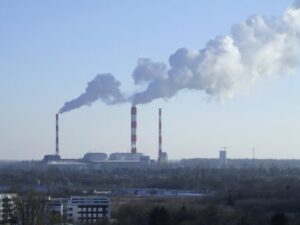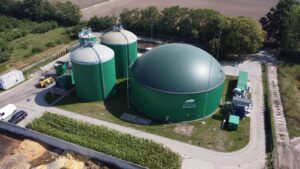It is not disputed that the quality of air in Poland is bad. „We are a sick man in Europe and we have several years to improve the quality of air,” Piotr Woźny, Government Plenipotentiary for the fight against smog, told a press conference on 9 April in Warsaw. The meeting was also attended by Adam Czyżewski, chief economist at PKN Orlen and Adam Pawłowicz, vice president at Lotos Paliwa.
Low-emission Transport Fund
During the meeting the positions of fuel concerns were presented referring to the fact of conducting work on the introduction of a fuel charge, the use of the Low-Emission Transport Fund, which will contribute and government plans that will cause the air quality in Poland to get significantly better in the next 10 years. Piotr Woźny talked about the pilot program that will be implemented in 33 Polish cities. The „Stop Smog” program assumes actions that will take care of the technical condition of buildings, replace the polluting sources of heat, support the poorest people who can not finance thermomodernisation themselves.
As Woźny said, „Brussels expects Poland to take active measures and bring tangible benefits quickly.” Therefore, Woźny believes that the emergence of a targeted financing program in the 2021-2027 perspective is the most likely. He also talked about the need to obtain the „biggest environmental effect” for the lowest possible costs, therefore the distribution of proceeds from the fuel surcharge is to be as follows: 15 percent of FNT will be allocated, and 85 percent will go to NFOŚiGW.
Piotr Woźny also mentioned the report prepared by the World Bank on the actual status of air quality in selected places in the country, stakeholders of the change process and the effectiveness of cooperation between central authorities, voivodship marshals and mayors. The first version of the document should be ready according to Woźny at the end of June 2018. According to the data provided by the government’s representative on the days when the air quality in Warsaw was the worst. There were almost twice as many patients reporting problems with respiration and cardiovascular health. Therefore, as Woźny said, the problem of the incidence of diseases and deaths, which is talked about in the context of smog, is certainly not exaggerated.
Fuels will not get expensive
Adam Czyżewski from PKN Orlen focused on two issues: the possibility of using FNT by fuel companies such as PKN Orlen in order to build the necessary infrastructure supporting the development of alternative fuels and estimates that allowed the group to develop a model in which the fuel surcharge will not impact on the price of fuel for the final recipient. The chief economist of PKN Orlen explained why the fear connected with the impact on the price of fuels related to the new fee is unjustified.
In turn, Adam Pawłowicz from Lotos mentioned a significant improvement in the company’s condition, obtained thanks to the elimination of the previously active gray market. However, he stressed that the company alone would not take the risk of building charging infrastructure for electric cars, because it is difficult to talk about the possibility of returning the investment. However, with the help of EU funds and support from the FNT, it will be possible. As he assured soon, because the corporation obtained financing from the EU program for the first batch of charging stations.
Participants of the meeting also agreed that the introduction of certificates confirming the quality of solid fuels sold is extremely important and used the example of service stations that sell standardized fuels and there is no way of selling a petrol with a significantly lower octane number from a distributor. The fuel charge is to bring PLN 1,7 billion annually. Thanks to the financing of activities aimed at improving air quality, Poland is to avoid penalties that threaten the country, and which can amount to as much as half a billion zlotys a year. The fuel surcharge is 8 groszy per liter of fuel.
Journalists asked during the conference, among other things, why the fuel fee did not cover LPG fuel and was Piotr Woźny the initiator of the introduction of the fee? The bailiff mentioned that this is not his initiative. No answer was given about LPG.








